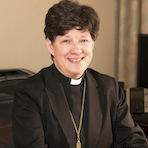March 2, 2017 in ELCA
Bishop Eaton: The Good Samaritan

In her March column for Living Lutheran, Presiding Bishop Elizabeth Eaton ponders the parable of the good Samaritan, reminding us that our new life in Christ leads us to answer a different question—not “Who is my neighbor?” but “How are we neighbor?” Read her column in English at livinglutheran.org/2017/02/the-good-shepherd or in Spanish at livinglutheran.org/2017/02/el-buen-samaritano.
The Good Samaritan

Bishop Elizabeth A. Eaton
I have been thinking a lot about the parable of the good Samaritan lately (Luke 10:25-37). Parts of it are so familiar—the unfortunate victim, the robbers, the priest, the Levite, the Samaritan—that I miss points of deeper meaning. We all know the compassion and generosity of the Samaritan has become the standard by which we measure our response to suffering. Hospitals are named Good Samaritan. All 50 states have a Good Samaritan law on the books. I always imagined (or hoped) that I would act like the good Samaritan were I ever in a similar situation.
There are two other characters connected to this story that I don’t always think about: the lawyer and Jesus. Theirs was not a casual conversation. The lawyer was looking to test Jesus. “Teacher, he said, what must I do to inherit eternal life?”
Jesus answers with a question: “What is written in the law?”
Being a good lawyer the man answered from Deuteronomy and Leviticus: “You shall love the Lord your God with all your heart, and with all your soul, and with all your strength, and with all your mind; and your neighbor as yourself.” Case closed. Conversation over.
But the lawyer couldn’t let it go: “… wanting to justify himself, he asked Jesus, ‘And who is my neighbor?’ ”
We know the man wanted to test Jesus and justify himself so his question was not an earnest inquiry about the Torah. Are some people my neighbor and some people not? How far does hospitality have to extend? Can there be limits to compassion? What is reasonable: Family? People on my block? My congregation? Fellow citizens? And, conversely, whom can I exclude? People across town or around the world? Who is my neighbor?
It’s in answer to this question that Jesus tells the parable—a parable designed to be as provocative as possible.
We call the Samaritan “good” but that word is not found in Scripture. No Jew would call a Samaritan “good” nor would any Samaritan call a Jew “good.” Samaritans and Jews regarded each other as ceremonially unclean, socially outcast and heretical. They would not have come up automatically in the neighbor category.
It’s not clear that the beaten Jewish man would have been entirely thrilled that he had been helped and touched by the Samaritan. (Think of the All in the Family episode where Archie Bunker realizes he has received a blood transfusion from an African-American man.)
Now it’s Jesus’ turn to ask a question: “Which of these three, do you think, was a neighbor to the man who fell into the hands of the robbers?”
This becomes the question for us and for these times. When we ask, “Who is my neighbor?” we sort people into categories. Is the refugee my neighbor? Is the Muslim my neighbor? Is the Jew my neighbor? Is the Latina my neighbor? And on and on. This makes for increasingly smaller neighborhoods. And this question can be driven by fear and suspicion. Left to ourselves we turn in and away.
Thank God that God has not left us to ourselves. Our new life in Christ leads us to ask and answer a different question. Not, “Who is my neighbor?” but “How are we neighbor?”
The world is a dangerous place—just check any news source or social media. There are people who mean to do harm to our country. Fear and the threat of danger divide us and constrict us. But we live in the hope of the resurrection and in the certainty of the redemption of the world through the death and resurrection of Jesus Christ. We no longer ask, “Who is my neighbor?” The question is now, “How are we neighbor?”
The lawyer answered Jesus’ question about who was neighbor to the man beaten by robbers with: “The one who showed him mercy.” Jesus said to him, and to us, “Go and do likewise.”
A monthly message from the presiding bishop of the Evangelical Lutheran Church in America. Her email address: . This column originally appeared in the March issue of Living Lutheran. Reprinted with permission.

